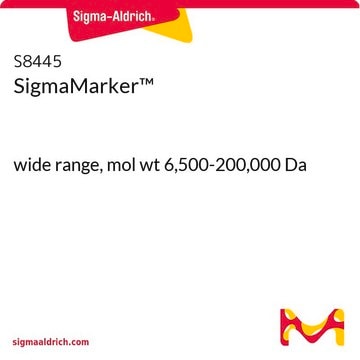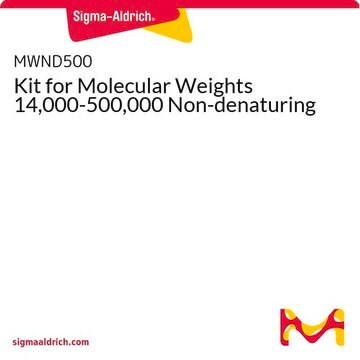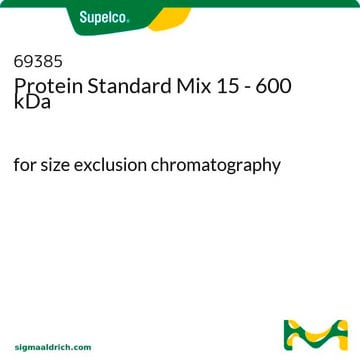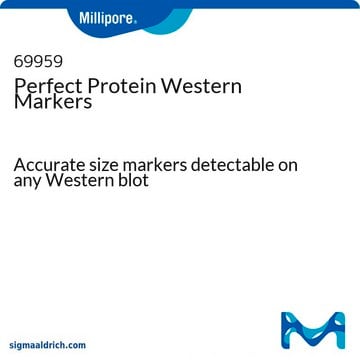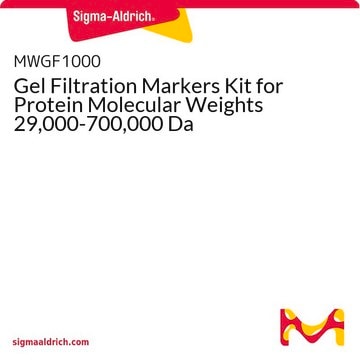69079
Perfect Protein Markers, 10-225 kDa
Synonym(s):
protein markers, protein molecular weight markers, protein standards
Sign Into View Organizational & Contract Pricing
All Photos(1)
About This Item
UNSPSC Code:
41105337
NACRES:
NC.01
Recommended Products
form
liquid
Quality Level
manufacturer/tradename
Novagen®
storage condition
OK to freeze
avoid repeated freeze/thaw cycles
shipped in
wet ice
storage temp.
−20°C
Related Categories
General description
The Perfect Protein<TMSYMBOL></TMSYMBOL> Markers are a novel set of recombinant proteins with definedsizes at convenient intervals. Designed for routine use in SDS-polyacrylamide gelelectrophoresis, the Perfect Protein Markers enable highly accurate size determination ofunknown samples. Unlike many conventional markers (e.g., ovalbumin, serum albumin, etc.), the Perfect Protein Markers contain no oligosaccharides that cause anomalous migration, heterogeneous "fuzzy" bands, or inaccurate size estimation. The markers are optimized for use with Coomassie blue staining, but adjusted amounts can also be used with other gel staining methods (e.g., silver staining, fluorescent dyes, etc.).
The Perfect Protein Markers, 15-150 kDa, include protein sizes of 15, 25, 35, 50, 75,100, and 150 kDa. Each vial contains 400 g protein. A 5-l load contains 0.5 g for each of the protein sizes, except for the 50-kDa band, which contains twice as much protein (1.0 g).
The Perfect Protein Markers, 10-225 kDa, include the protein sizes listed above and two additional proteins, 10 kDa and 225 kDa, for applications requiring a broader size range. Each vial contains 500 g protein. A 5-l load contains 0.5 g for each of the protein sizes, except for the 50-kDa band, which containstwice as much protein (1.0 g).
The 4X SDS Sample Buffer (Cat. No. 70607), which is separately available, is a standard formulation commonly used for SDS-PAGE analysis of proteins. The solution includes DTT for complete denaturation of disulfide bonds. The buffer can be used at a final concentration of 2X for most applications.
The Perfect Protein Markers, 15-150 kDa, include protein sizes of 15, 25, 35, 50, 75,100, and 150 kDa. Each vial contains 400 g protein. A 5-l load contains 0.5 g for each of the protein sizes, except for the 50-kDa band, which contains twice as much protein (1.0 g).
The Perfect Protein Markers, 10-225 kDa, include the protein sizes listed above and two additional proteins, 10 kDa and 225 kDa, for applications requiring a broader size range. Each vial contains 500 g protein. A 5-l load contains 0.5 g for each of the protein sizes, except for the 50-kDa band, which containstwice as much protein (1.0 g).
The 4X SDS Sample Buffer (Cat. No. 70607), which is separately available, is a standard formulation commonly used for SDS-PAGE analysis of proteins. The solution includes DTT for complete denaturation of disulfide bonds. The buffer can be used at a final concentration of 2X for most applications.
Features and Benefits
• Markers are supplied at the working dilution ingel loading buffer; concentration optimized forCoomassie blue staining
• Recombinant, unmodified markers producesharp, accurately sized bands
• Available in two size ranges:
15-150 kDa
10-225 kDa
• Recombinant, unmodified markers producesharp, accurately sized bands
• Available in two size ranges:
15-150 kDa
10-225 kDa
Warning
Toxicity: Toxic (F)
Legal Information
NOVAGEN is a registered trademark of Merck KGaA, Darmstadt, Germany
Signal Word
Warning
Hazard Statements
Precautionary Statements
Hazard Classifications
Eye Irrit. 2 - Skin Sens. 1
Storage Class Code
12 - Non Combustible Liquids
WGK
WGK 2
Flash Point(F)
Not applicable
Flash Point(C)
Not applicable
Certificates of Analysis (COA)
Search for Certificates of Analysis (COA) by entering the products Lot/Batch Number. Lot and Batch Numbers can be found on a product’s label following the words ‘Lot’ or ‘Batch’.
Already Own This Product?
Find documentation for the products that you have recently purchased in the Document Library.
Customers Also Viewed
Rebeccah A Warmack et al.
The Journal of biological chemistry, 294(32), 12203-12219 (2019-06-27)
Transparency in the lens is accomplished by the dense packing and short-range order interactions of the crystallin proteins in fiber cells lacking organelles. These features are accompanied by a lack of protein turnover, leaving lens proteins susceptible to a number
Csenge Filep et al.
Analytical chemistry, 92(5), 4023-4028 (2020-02-06)
The temperature-dependent migration of molecular weight protein size standards and several biotherapeutic proteins were studied in sodium dodecyl sulfate capillary gel electrophoresis (SDS-CGE) in the interval from 15 to 60 °C using borate cross-linked dextran sieving matrix. Arrhenius plots were
Our team of scientists has experience in all areas of research including Life Science, Material Science, Chemical Synthesis, Chromatography, Analytical and many others.
Contact Technical Service
